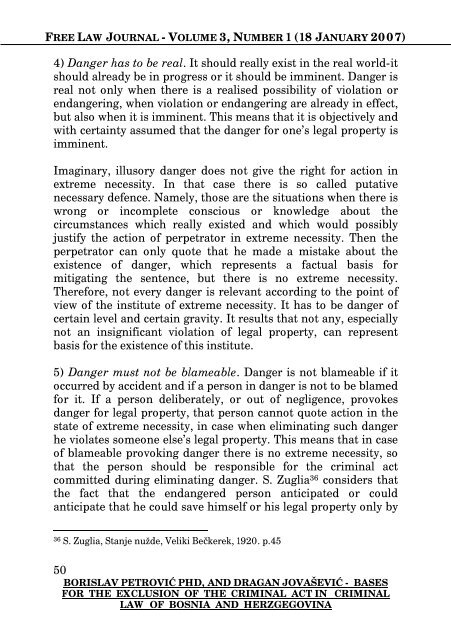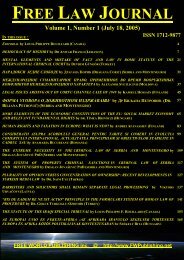free law journal - volume 3, number 1 (18 january 2007)
free law journal - volume 3, number 1 (18 january 2007)
free law journal - volume 3, number 1 (18 january 2007)
You also want an ePaper? Increase the reach of your titles
YUMPU automatically turns print PDFs into web optimized ePapers that Google loves.
FREE LAW JOURNAL - VOLUME 3, NUMBER 1 (<strong>18</strong> JANUARY <strong>2007</strong>)4) Danger has to be real. It should really exist in the real world-itshould already be in progress or it should be imminent. Danger isreal not only when there is a realised possibility of violation orendangering, when violation or endangering are already in effect,but also when it is imminent. This means that it is objectively andwith certainty assumed that the danger for one’s legal property isimminent.Imaginary, illusory danger does not give the right for action inextreme necessity. In that case there is so called putativenecessary defence. Namely, those are the situations when there iswrong or incomplete conscious or knowledge about thecircumstances which really existed and which would possiblyjustify the action of perpetrator in extreme necessity. Then theperpetrator can only quote that he made a mistake about theexistence of danger, which represents a factual basis formitigating the sentence, but there is no extreme necessity.Therefore, not every danger is relevant according to the point ofview of the institute of extreme necessity. It has to be danger ofcertain level and certain gravity. It results that not any, especiallynot an insignificant violation of legal property, can representbasis for the existence of this institute.5) Danger must not be blameable. Danger is not blameable if itoccurred by accident and if a person in danger is not to be blamedfor it. If a person deliberately, or out of negligence, provokesdanger for legal property, that person cannot quote action in thestate of extreme necessity, in case when eliminating such dangerhe violates someone else’s legal property. This means that in caseof blameable provoking danger there is no extreme necessity, sothat the person should be responsible for the criminal actcommitted during eliminating danger. S. Zuglia 36 considers thatthe fact that the endangered person anticipated or couldanticipate that he could save himself or his legal property only by36S. Zuglia, Stanje nužde, Veliki Bečkerek, 1920. p.4550BORISLAV PETROVIĆ PHD, AND DRAGAN JOVAŠEVIĆ - BASESFOR THE EXCLUSION OF THE CRIMINAL ACT IN CRIMINALLAW OF BOSNIA AND HERZGEGOVINA
















